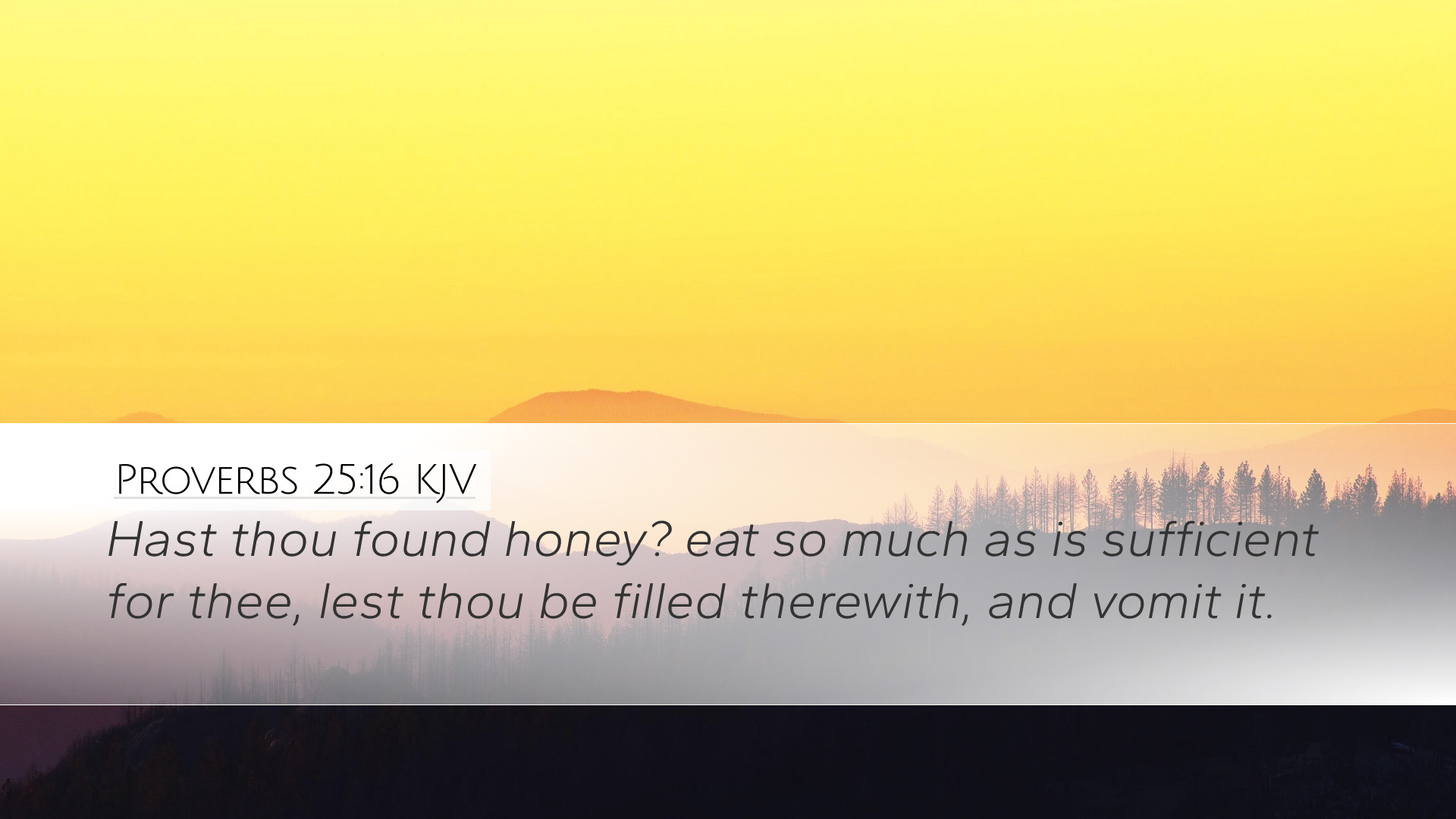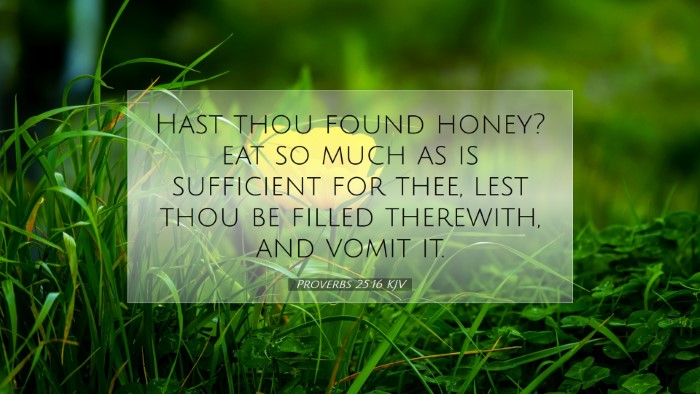Commentary on Proverbs 25:16
Proverbs 25:16 states:
"Hast thou found honey? eat so much as is sufficient for thee, lest thou be filled therewith, and vomit it."
Introduction
This verse encapsulates a profound moral truth regarding the moderation and balance necessary in all aspects of life. The metaphor of honey, a symbol of sweetness and pleasure, alerts the reader to the dangers of excess and indulgence. It serves as a warning against overindulgence which can lead to unpleasant consequences.
Commentary Insights
Various renowned commentators have delved into the depths of this proverb, providing a rich understanding of its meaning.
Matthew Henry's Commentary
Matthew Henry emphasizes that the proverb highlights the need for moderation in enjoying the good things in life, represented by honey. Henry notes:
- Moderation in Enjoyment: Just as honey is sweet and desirable, so are many pleasures and possessions. However, he warns that unchecked desire can lead to consequences. Indulging too much in even the best things can lead to them becoming detrimental to one’s well-being.
- Caution Against Overindulgence: Henry profoundly articulates that filling oneself too much with pleasure can lead to distaste. Biblical wisdom does not encourage duty-free consumption but promotes balance.
Albert Barnes' Notes
Albert Barnes provides additional insights on this verse, focusing on its implications for various areas of life:
- Self-Control: Barnes argues that self-control is a hallmark of a wise person. The notion of "sufficient" indicates that discernment is necessary in how much of life’s pleasures one chooses to engage with.
- Application to Daily Living: He extends the teaching to other areas, warning that gluttony or excess in anything, whether food, wealth, or pleasures, ultimately results in negative outcomes. This principle can be applied universally, whether regarding food, material possessions, or even knowledge.
Adam Clarke's Commentary
Adam Clarke also affirms the theme of moderation while providing a broader context:
- The Symbolism of Honey: Clarke notes that honey is a metaphor for all good and delectable things. His focus on honey's sweetness reflects the human appetite for pleasure and enjoyment, which must be tempered with wisdom.
- Biblical Foundation for Restraint: He draws parallels to other scripture passages, illustrating that many biblical principles exemplify the wisdom of temperance, supporting the idea that indulgence can become a source of error.
Theological Implications
This verse's core message resonates with theological themes surrounding God's provision and wisdom. It reflects the broader biblical narrative regarding the importance of balance in our relationship with creation's good gifts.
- God's Good Gifts: Just as honey is a gift from God, so are all pleasures in life. The acknowledgment of divine provision encourages gratitude and responsibility in our consumption of these gifts.
- The Nature of Sin: Sin often arises from the misuse of these divine gifts. Proverbs 25:16 serves as a reminder that caution and mindfulness should guide our actions to avoid the pitfalls of excess.
Practical Applications
For pastors, students, and theologians, this verse offers various practical applications:
- Teaching on Moderation: Pastoral care can incorporate this wisdom to urge congregants towards a balanced lifestyle that practices moderation and avoids extremes.
- Personal Reflection: Individuals should reflect on their own lives to identify areas of excess or imbalance, allowing this proverb to guide their choices in consumption, work, or personal interests.
- Encouragement of Discipleship: Encourage discipleship and accountability among believers, promoting discussions about how to enjoy God's gifts while exercising restraint.
Conclusion
Proverbs 25:16 encapsulates the critical theme of moderation within the framework of divine blessings. Drawing upon insights from various biblical commentators enriches the understanding of this proverb and its implications for healthy living. As we navigate the delights of life, may we do so with wisdom, ensuring that our enjoyment does not lead to regret but fosters spiritual and physical well-being.


